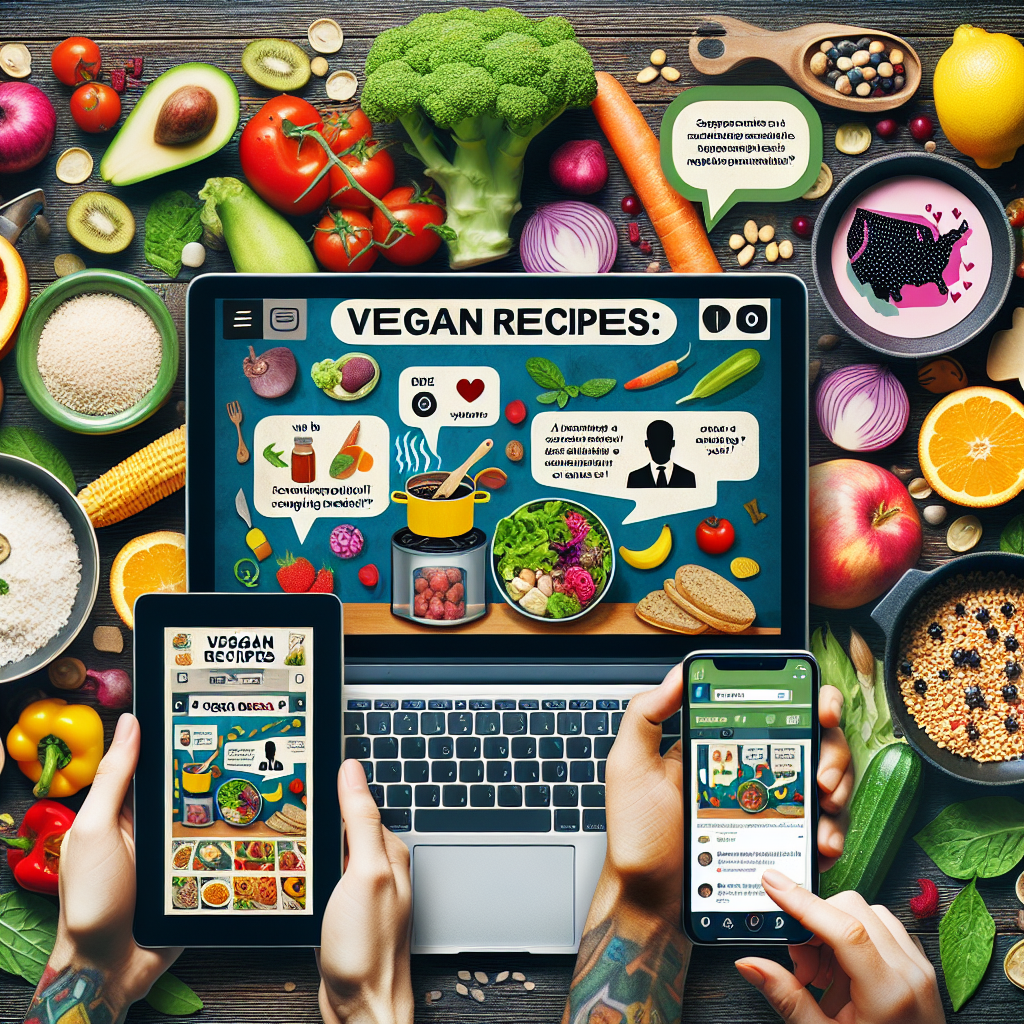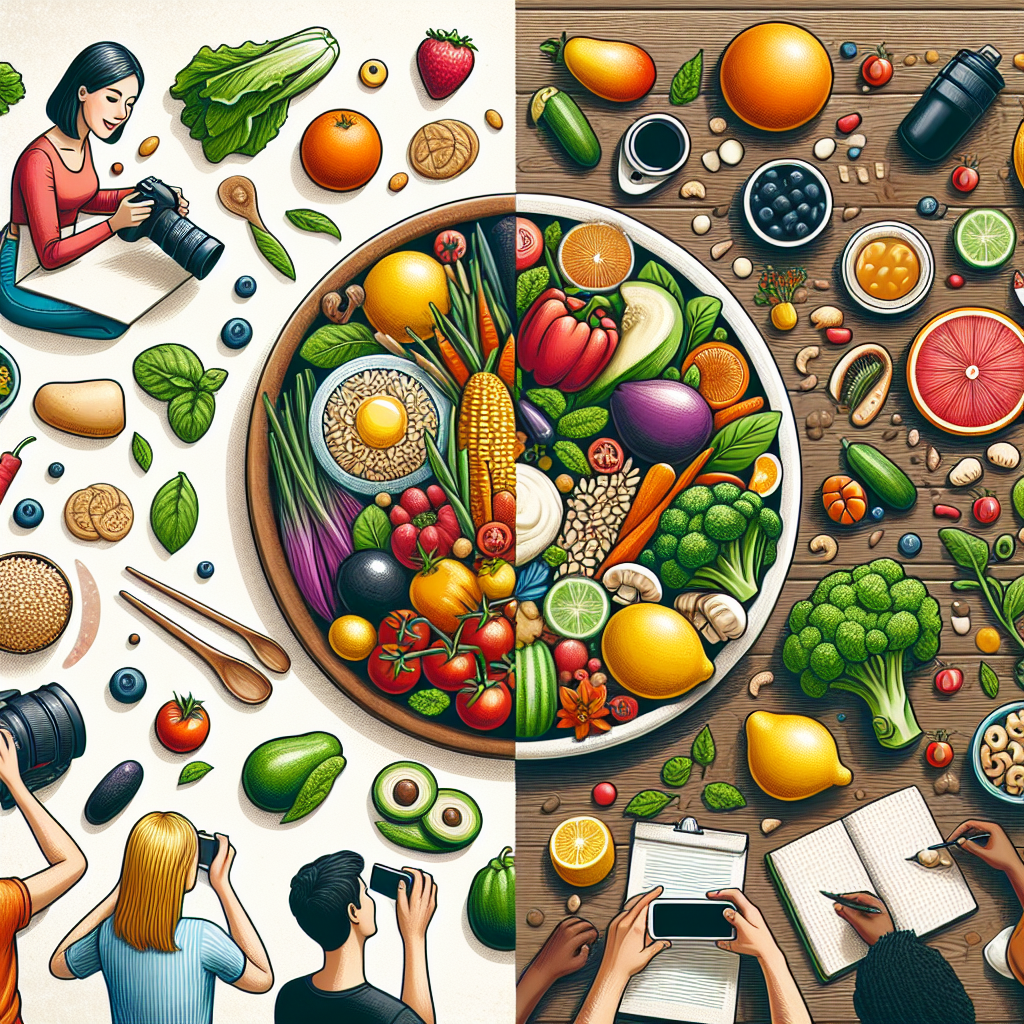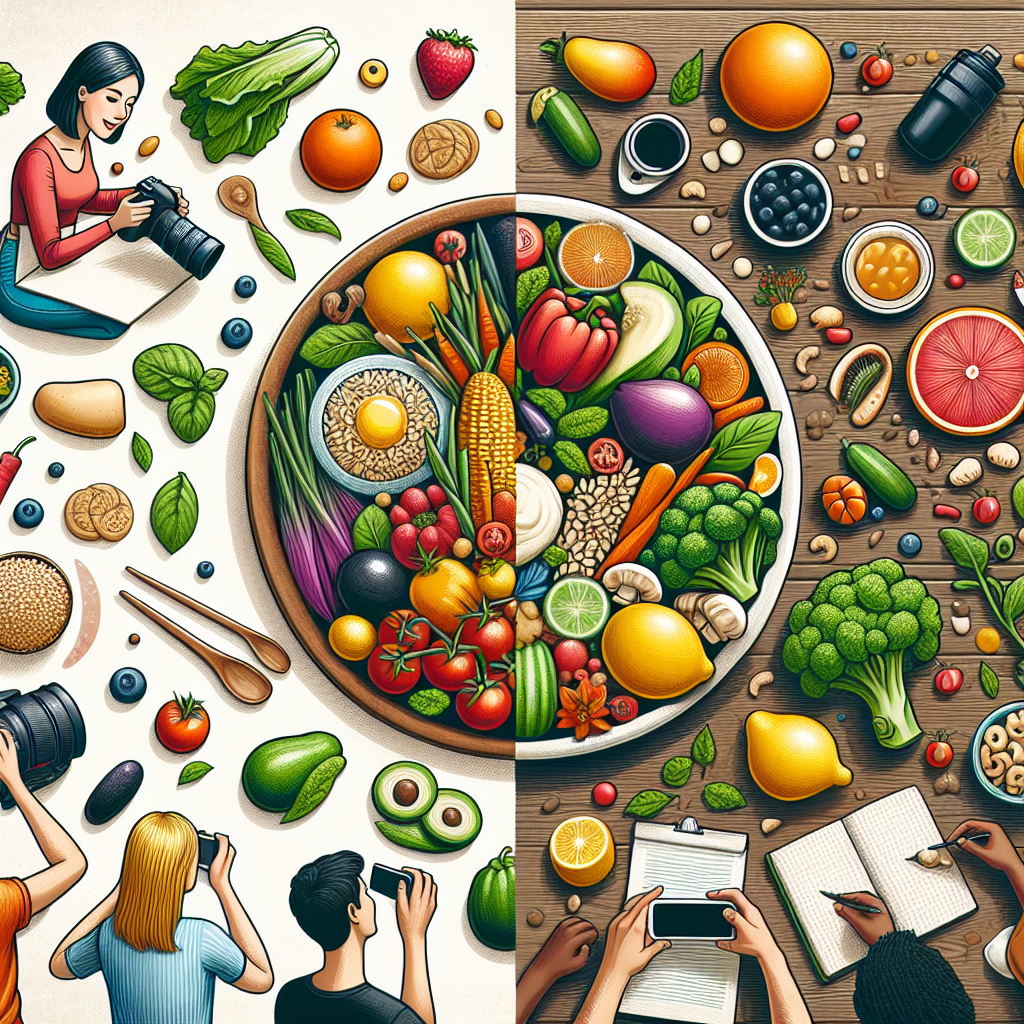Vegan Blogs, a hub of plant-based inspiration, aims to captivate and guide readers on their journey towards a more compassionate and sustainable lifestyle. Filled with mouthwatering recipes, insightful articles, and practical advice, these blogs offer a friendly and inviting space to explore the world of veganism. With a focus on nourishing both body and soul, Vegan Blogs is your go-to source for discovering the endless possibilities and benefits of living a plant-powered life.

1. Vegan Lifestyle
Living a vegan lifestyle is not only a personal choice but also a commitment to a cruelty-free and eco-friendly way of living. Transitioning to a vegan lifestyle can be an exciting journey filled with new experiences and discoveries. Here are some tips to help make the transition smoother:
1.1 Tips on Transitioning to a Vegan Lifestyle
- Take it slow: Transitioning to a vegan lifestyle doesn’t have to happen overnight. Start by gradually eliminating animal products from your diet and lifestyle and introduce more plant-based alternatives.
- Educate yourself: Learn about the benefits of veganism, the ethical aspects of animal agriculture, and the environmental impact of our dietary choices. This knowledge will help strengthen your resolve and keep you motivated.
- Find vegan alternatives: Explore the wide variety of vegan substitutes available for meat, dairy, and other animal-based products. Experiment with plant-based proteins, dairy alternatives, and vegan-friendly ingredients to discover new flavors and textures.
- Discover new recipes: Explore vegan recipes online, in cookbooks, or through vegan blogs. Try out different cuisines and experiment with ingredients to find new favorite dishes.
- Seek support: Join online vegan communities, attend vegan events, and connect with like-minded individuals. Surrounding yourself with a supportive community can make the transition easier and provide valuable advice and encouragement.
1.2 Benefits of a Vegan Diet and Lifestyle
Adopting a vegan diet and lifestyle comes with numerous benefits, both for our health and the environment. Some of the key benefits include:
- Improved health: A well-balanced vegan diet can provide all the essential nutrients needed for optimal health. Plant-based diets have been associated with lower rates of heart disease, obesity, high blood pressure, and certain types of cancer.
- Environmental sustainability: Animal agriculture is a major contributor to deforestation, greenhouse gas emissions, and water pollution. By choosing a vegan lifestyle, we can significantly reduce our carbon footprint and help protect the planet.
- Animal welfare: By avoiding animal products, we contribute to the reduction of animal suffering. Veganism promotes compassion and respect for all living beings.
- Increased energy: Many people report feeling more energized and vibrant after adopting a vegan diet. Plant-based foods are generally rich in nutrients and help support healthy digestion and metabolism.
- Weight management: A vegan diet can be an effective tool for weight loss and weight management. Plant-based foods are typically lower in calories and saturated fats compared to animal-derived products.
1.3 Easy Vegan Recipes for Beginners
Whether you’re new to veganism or simply looking for some easy and delicious plant-based recipes, there are plenty of options to choose from. Here are a few beginner-friendly recipes to get you started:
- Vegan Buddha Bowl: This colorful and nutrient-packed bowl typically consists of a base of grains or greens, topped with a variety of roasted or sautéed vegetables, legumes or tofu for protein, and a flavorful dressing or sauce.
- Chickpea Curry: A cozy and comforting dish, chickpea curry is easy to make and packed with protein and fiber. Simply sauté onions, garlic, and spices, add cooked chickpeas and diced tomatoes, and simmer until flavors meld together.
- Vegan Tacos: Who doesn’t love tacos? Fill corn tortillas with seasoned beans, grilled veggies, guacamole, salsa, and a squeeze of lime for a flavorful and satisfying meal.
- Vegan Stir-Fry: A quick and versatile dish, stir-fries can be made with a variety of vegetables like bell peppers, broccoli, carrots, and snap peas. Add tofu or tempeh for protein and flavor with soy sauce, ginger, and garlic.
1.4 Vegan Meal Planning and Food Preparation
Meal planning is an essential tool for successful vegan living. By planning your meals in advance, you can ensure you have nutritious and delicious options readily available. Here are some tips for vegan meal planning and food preparation:
- Plan your meals: Take some time each week to plan your meals and make a shopping list. Look for recipes that use similar ingredients to minimize waste and simplify your shopping trips.
- Batch cook: Dedicate a day or time in the week to preparing larger quantities of staple dishes, such as grains, beans, or roasted vegetables. This will save you time during busy weekdays and ensure you always have something nutritious to eat.
- Utilize leftovers: Don’t let leftovers go to waste! Get creative and transform them into new dishes or use them for packed lunches.
- Stock your pantry: Keep a well-stocked pantry with vegan essentials such as grains, legumes, canned goods, and spices. This will make it easier to whip up a quick and tasty meal, even on days when you don’t have time to shop.
- Invest in food storage containers: Having a variety of food storage containers will make it easier to store and transport meals. Glass containers are an eco-friendly and durable option.
1.5 Vegan Grocery Shopping Tips
Navigating the grocery store as a vegan can be a breeze with a well-thought-out shopping strategy. Here are some tips to make your vegan grocery shopping experience smooth and efficient:
- Plan your shopping list: Before heading to the store, make a list of the items you need based on your meal plan. This will help you stay focused and avoid impulse purchases.
- Shop the perimeter: Many grocery stores place fresh produce, grains, and plant-based protein sources around the perimeter of the store. This is where you’ll find most of your vegan essentials.
- Read labels: Take the time to read labels and familiarize yourself with common non-vegan ingredients. Look out for animal-derived ingredients such as dairy, eggs, honey, and gelatin.
- Explore the bulk section: Buying staples like grains, nuts, and seeds from the bulk section can be more economical and reduce packaging waste.
- Support local farmers’ markets: Check out your local farmers’ market for a wide variety of fresh fruits, vegetables, and other vegan-friendly products. This is a great way to support local growers and discover seasonal produce.
Plant-Powered Perspectives: Nourishing Insights and Inspiration from Vegan Blogs
2. Vegan Nutrition
Ensuring proper nutrition on a vegan diet is essential for overall well-being. By understanding the essential nutrients for vegans and incorporating a variety of plant-based protein sources, we can thrive on a vegan diet.
2.1 Essential Nutrients for Vegans
While a vegan diet can provide all the necessary nutrients for optimal health, there are a few key nutrients that require special attention. These include:
- Protein: Protein is made up of amino acids, which are the building blocks of our body. Plant-based protein sources include legumes, tofu, tempeh, seitan, quinoa, lentils, and nuts.
- Iron: Plant-based sources of iron include legumes, tofu, dried fruits, fortified cereals, spinach, and quinoa. Pairing iron-rich foods with vitamin C-rich foods can enhance iron absorption.
- Calcium: While dairy products are often associated with calcium, there are plenty of plant-based sources available, such as kale, broccoli, fortified non-dairy milk, tofu, and almonds.
- Omega-3 fatty acids: Plant-based sources of omega-3 fatty acids include flaxseeds, chia seeds, hemp seeds, walnuts, and algae-based supplements.
- Vitamin B12: Vitamin B12 is a nutrient that is essential for proper nerve function and the formation of red blood cells. It is primarily found in animal-derived foods, so vegans should consider taking a B12 supplement or consume fortified foods.
2.2 Plant-Based Protein Sources
Protein is a vital macronutrient that plays a crucial role in repairing tissues, building muscle, and supporting various bodily functions. Fortunately, plant-based diets can provide ample protein from a variety of sources. Some excellent plant-based protein sources include:
- Legumes: Beans, lentils, chickpeas, and other legumes are not only rich in protein but also high in fiber, iron, and other essential nutrients.
- Tofu and Tempeh: These soy-based products are versatile and can be used in a variety of dishes. They provide a substantial amount of protein and can be a crucial component of vegan meals.
- Seitan: Made from wheat gluten, seitan is a high-protein meat substitute that is often used in dishes like stir-fries, sandwiches, and stews.
- Quinoa: Considered a complete protein, quinoa is a grain that provides all essential amino acids. It can be used as a base for salads, side dishes, or even breakfast porridge.
- Nuts and Seeds: Almonds, walnuts, peanuts, chia seeds, and hemp seeds are all excellent sources of protein and healthy fats. They can be enjoyed as a snack, added to salads, or incorporated into baked goods.
2.3 Vegan Alternatives to Dairy Products
Many people are concerned about giving up dairy products when transitioning to a vegan lifestyle. However, there are numerous delicious and nutritious alternatives available. Here are some vegan alternatives to popular dairy products:
- Milk: Plant-based milk alternatives such as almond, soy, oat, coconut, and rice milk are widely available. These options can be used in cooking, baking, or enjoyed on their own.
- Cheese: There are now a variety of vegan cheese options made from nuts, soy, or coconut oil. They can be melted, grated, or consumed as spreads.
- Yogurt: Look for dairy-free yogurts made from soy, almond, coconut, or oat milk. These yogurts can be enjoyed with fruit, used in smoothies, or incorporated into desserts.
- Ice cream: Vegan ice cream is becoming increasingly popular and is now widely available in various flavors and textures. Look for options made from almond, coconut, or soy milk.
- Butter: Swap dairy butter with plant-based alternatives made from coconut oil, olive oil, or soy-based spreads. These alternatives can be used for cooking, baking, and spreading on toast.
2.4 Vitamin B12 Supplementation for Vegans
Vitamin B12 is a critical nutrient that is primarily found in animal-derived foods. Since a vegan diet excludes these sources, it is essential to ensure adequate B12 intake through supplementation or fortified foods. Here are some options for obtaining vitamin B12 on a vegan diet:
- B12 Supplements: Taking a daily or weekly B12 supplement is a simple and effective way to ensure sufficient intake. Different forms of B12 supplements are available, including tablets, chewable tablets, and sublingual (under the tongue) drops.
- Fortified Foods: Some plant-based milks, breakfast cereals, and meat alternatives are fortified with vitamin B12. Check the labels to ensure that they are fortified with a sufficient amount of B12.
- Nutritional Yeast: Nutritional yeast is a deactivated yeast often used to add a cheesy or nutty flavor to dishes. Some brands of nutritional yeast are fortified with B12, making it a tasty addition to vegan recipes.
3. Vegan Recipes
Delicious and satisfying vegan recipes are abundant, and there is a wide variety of options to suit every taste and preference. Whether you’re looking for breakfast ideas, lunch and dinner recipes, or decadent desserts, the vegan culinary world has it all.
3.1 Breakfast Ideas and Recipes
Breakfast is often considered the most important meal of the day, and there are countless vegan options to start your day right. Here are some tasty and nutritious vegan breakfast ideas:
- Overnight Chia Pudding: Mix chia seeds with plant-based milk, sweetener of choice, and your favorite flavors like vanilla or cocoa powder. Let it sit in the fridge overnight, and in the morning, you’ll have a creamy and delicious chia pudding.
- Vegan Pancakes: Whip up fluffy and mouthwatering pancakes using plant-based milk, flour, and baking powder. Add in your favorite toppings like fresh fruits, maple syrup, or vegan chocolate chips.
- Avocado Toast: Spread mashed avocado on toasted bread and top with a sprinkle of salt, pepper, and any additional toppings like sliced tomatoes, red pepper flakes, or toasted sesame seeds.
- Smoothie Bowls: Blend frozen fruits, plant-based milk, and a handful of spinach or kale for a vibrant and nutrient-packed smoothie bowl. Top with granola, sliced fruits, coconut flakes, or chia seeds for added texture and flavor.
3.2 Lunch and Dinner Recipes
Lunch and dinner are ideal times to explore hearty and satisfying vegan meals. From colorful salads to flavorful curries, the options are endless. Here are some easy and delicious vegan lunch and dinner recipes:
- Quinoa Salad: Cook quinoa according to package instructions and let it cool. Toss with mixed vegetables like cherry tomatoes, cucumbers, bell peppers, and add fresh herbs like parsley or mint. Drizzle with lemon vinaigrette or your favorite dressing.
- Chickpea Curry: Sautee onions, garlic, and spices like turmeric, cumin, coriander, and garam masala. Add cooked chickpeas, diced tomatoes, and coconut milk. Simmer until flavors meld together and serve over steamed rice or with flatbread.
- Veggie Stir-Fry: Heat oil in a pan and stir-fry your favorite vegetables like broccoli, bell peppers, snap peas, and mushrooms. Add tofu or tempeh for protein and flavor with ginger, garlic, and soy sauce. Serve with rice or noodles.
- Lentil Shepherd’s Pie: Sautee onions, carrots, and celery until softened. Add cooked lentils, vegetable broth, tomato paste, and herbs like thyme and rosemary. Simmer until the mixture thickens. Top with mashed potatoes and bake until golden brown and bubbly.
3.3 Delicious Vegan Desserts
Indulging in a sweet treat shouldn’t be off-limits for vegans. There are plenty of delicious vegan desserts that are just as satisfying as their non-vegan counterparts. Here are some mouthwatering vegan dessert recipes:
- Vegan Chocolate Cake: Combine flour, cocoa powder, sugar, baking soda, and salt in a bowl. Mix in vegetable oil, vanilla extract, and plant-based milk until smooth. Bake and frost with a rich and creamy vegan chocolate ganache.
- Vegan Banana Bread: Mix mashed ripe bananas with flour, sugar, baking soda, salt, and spices like cinnamon or nutmeg. Add your choice of mix-ins like chocolate chips, chopped nuts, or dried fruits. Bake until golden and fragrant.
- Berry Parfait: Layer dairy-free yogurt with fresh berries, granola, and a drizzle of maple syrup. Repeat the layers until you reach your desired height. Top with additional berries and a sprinkle of shredded coconut.
- Vegan Coconut Ice Cream: Blend full-fat coconut milk, sugar, and vanilla extract until smooth. Churn in an ice cream maker according to the manufacturer’s instructions. Add mix-ins like chocolate chips, crushed cookies, or fruit puree for extra flavor.
3.4 Quick and Easy Vegan Snacks
Sometimes, all we need is a quick and satisfying bite to keep us going throughout the day. Vegan snacks can be both healthy and delicious. Here are some ideas for quick and easy vegan snacks:
- Energy Balls: Mix together dates, nuts, seeds, and flavorings like cocoa powder, vanilla extract, or coconut flakes in a food processor. Roll the mixture into small balls and refrigerate until firm.
- Hummus and Veggie Sticks: Serve store-bought or homemade hummus with sliced vegetables like carrots, celery, bell peppers, or cucumber for a refreshing and crunchy snack.
- Roasted Chickpeas: Toss cooked chickpeas with olive oil, salt, and your choice of spices like paprika, cumin, or garlic powder. Roast until crispy for a protein-packed and savory snack.
- Guacamole and Tortilla Chips: Mash ripe avocados with lime juice, diced tomatoes, red onion, cilantro, and salt. Serve with your favorite tortilla chips for a creamy and flavorful snack.
3.5 Vegan Meal Prep Ideas
Meal prepping can help save time and ensure you have healthy and satisfying meals readily available throughout the week. Here are some vegan meal prep ideas to make your busy week a little easier:
- Mason Jar Salads: Layer salad ingredients in a mason jar starting with the dressing, then add sturdy vegetables, proteins, and finally the greens. When ready to eat, shake the jar to distribute the dressing and enjoy a fresh and crisp salad.
- Freezer-Friendly Burritos: Make a large batch of vegan burritos filled with beans, rice, roasted vegetables, and salsa. Wrap them individually in aluminum foil and freeze. When needed, simply reheat in the oven or microwave for a quick and filling meal.
- Buddha Bowls: Prepare the components of a Buddha bowl in advance, including cooked grains, roasted vegetables, protein sources, and dressings. Assemble the bowls for quick and nourishing meals throughout the week.
- Overnight Oats: Combine oats, plant-based milk, chia seeds, sweetener of choice, and flavorings like cinnamon or vanilla extract in a jar or container. Let it sit in the fridge overnight, and in the morning, you’ll have a convenient and nutritious breakfast ready to grab and go.
4. Vegan Fitness
Contrary to popular belief, a vegan diet can provide all the necessary nutrients for optimal fitness performance. Many athletes and fitness enthusiasts thrive on a plant-based diet. Here’s everything you need to know about vegan fitness:
4.1 Vegan Athletes and Their Success Stories
Over the years, there have been countless vegan athletes who have excelled in their respective sports. From high-performance runners to world-class weightlifters, the success stories of vegan athletes continue to inspire others to adopt a plant-based diet. Some notable vegan athletes include:
- Scott Jurek: Ultramarathoner Scott Jurek set numerous records, including the US record for the most miles run in 24 hours and winning the prestigious Western States 100-Mile Endurance Run, all on a plant-based diet.
- Venus Williams: Tennis superstar Venus Williams has been following a vegan diet to manage her autoimmune disease and improve her fitness and performance on the court.
- Romain Dumas: Professional race car driver Romain Dumas adopted a vegan diet and went on to win the famous Pikes Peak International Hill Climb race, breaking the record in the process.
- Patrik Baboumian: Known as the “Strongest Man in Germany,” Patrik Baboumian is a powerlifter and former bodybuilder who thrives on a vegan diet and promotes the benefits of plant-based nutrition for athletic performance.
These vegan athletes are proof that a plant-based diet can fuel athletic performance and enable individuals to reach their full potential.
4.2 Importance of Nutrition for Vegan Fitness
Proper nutrition plays a crucial role in fueling athletic performance and supporting recovery. Vegan athletes must ensure they are meeting their nutritional needs to optimize their fitness journey. Key considerations for vegan fitness nutrition include:
- Sufficient Calories: Athletes require an adequate amount of calories to support their energy needs. Whole plant-based foods such as grains, legumes, and nuts can provide the necessary calories for fuel.
- Protein Intake: Consuming adequate protein is essential for muscle repair, recovery, and growth. Plant-based protein sources such as legumes, tofu, tempeh, seitan, and quinoa can help vegans meet their protein needs.
- Carbohydrates: Carbohydrates are the primary source of fuel for athletic performance. Whole grains, fruits, and starchy vegetables are excellent sources of carbohydrates that provide sustained energy.
- Healthy Fats: Essential for hormone regulation and overall health, healthy fats can be found in plant-based sources such as avocados, nuts, seeds, and olive oil.
- Micronutrients: Ensuring sufficient intake of vitamins and minerals is essential for overall health and optimum performance. A well-planned vegan diet can provide these nutrients, but vegans should pay attention to specific nutrients such as iron, calcium, zinc, and vitamin B12.
4.3 Vegan Pre and Post-Workout Meals
What we eat before and after a workout can significantly impact athletic performance and recovery. Here are some ideas for vegan pre and post-workout meals:
- Pre-Workout Snacks: Opt for easily digestible carbohydrates about 30 minutes to an hour before your workout. Examples include a banana, a handful of dates, or a slice of whole grain bread with nut butter.
- Post-Workout Meal: Aim to consume a balanced meal within 1-2 hours after your workout. Include a source of protein such as tofu, tempeh, or plant-based protein powder, along with a serving of complex carbohydrates like quinoa or sweet potatoes. Add a variety of vegetables for added nutrients and fiber.
- Smoothies: Smoothies can be an excellent post-workout option as they provide a quick and convenient way to replenish nutrients. Blend plant-based protein powder, frozen fruits, plant-based milk, and a handful of leafy greens for a nutrient-packed and refreshing option.
4.4 Building Muscle on a Vegan Diet
Contrary to the misconception that muscle building requires animal protein, it is entirely possible to build muscle on a vegan diet. Here are some key considerations for building muscle on a vegan diet:
- Sufficient Protein Intake: Protein is necessary for muscle repair and growth. Ensure you are consuming a variety of plant-based protein sources throughout the day to meet your protein needs.
- Leucine-Rich Foods: Leucine is an amino acid that plays a significant role in muscle protein synthesis. Foods such as lentils, chickpeas, soy products, quinoa, and pumpkin seeds are all good sources of leucine.
- Caloric Surplus: To build muscle, you need to consume more calories than you burn. Focus on nutrient-dense, calorie-rich foods such as nuts, seeds, avocados, and whole grains.
- Resistance Training: Incorporating regular resistance training into your fitness routine is crucial for building muscle. Work with a qualified trainer to design a workout plan that suits your goals and abilities.
4.5 Vegan Supplements for Fitness Enthusiasts
While it is possible to obtain all the necessary nutrients from a well-planned vegan diet, some athletes choose to supplement with specific nutrients to optimize their performance and recovery. Here are some vegan supplements commonly used by fitness enthusiasts:
- Plant-based Protein Powder: Protein powders made from plant sources like pea, rice, or hemp provide an easy and convenient way to meet increased protein needs.
- Branched-Chain Amino Acids (BCAAs): BCAAs are essential amino acids that can aid in muscle recovery. Vegan BCAA supplements derived from plant-based sources are available.
- Creatine: Creatine is a compound found naturally in small amounts in animal products and can also be synthesized by the body. Vegan creatine supplements derived from fermented sources are available and can be used to enhance muscle strength and power.
- Omega-3 Fatty Acids: Omega-3 supplements derived from algae are a vegan-friendly alternative to fish oil and can help reduce exercise-induced inflammation and support overall well-being.

5. Vegan Travel
Traveling as a vegan can be an exciting adventure, exploring new cultures and cuisines while staying true to your values. With careful planning and some helpful tips, it’s possible to enjoy vegan-friendly experiences wherever you go.
5.1 Vegan-Friendly Travel Destinations
More and more destinations around the world are becoming vegan-friendly, offering a range of plant-based options for travelers. Some vegan-friendly destinations include:
- Berlin, Germany: Berlin has a thriving vegan scene with numerous vegan restaurants, cafes, and food markets. Don’t miss the famous vegan kebabs and burgers!
- Tel Aviv, Israel: Tel Aviv is known for its vegan-friendly culture, with vegan options available in almost every restaurant. Explore the vibrant street food scene and indulge in vegan versions of Middle Eastern classics.
- Chiang Mai, Thailand: Thailand is known for its delicious vegan cuisine, and Chiang Mai is a haven for plant-based food enthusiasts. Enjoy tasty vegan street food, visit vegetable markets, and take cooking classes to learn the secrets of Thai vegan cooking.
- Portland, Oregon, USA: Portland has been dubbed the vegan capital of the United States, with a plethora of vegan restaurants, food carts, and vegan-friendly events throughout the year. Enjoy vegan donuts, food truck festivals, and farm-to-table dining experiences.
5.2 Tips for Eating Vegan While Traveling
Traveling as a vegan requires some additional planning, but with these tips, you can enjoy a variety of vegan options wherever you go:
- Research Ahead: Before traveling, research vegan-friendly restaurants, cafes, and markets in the destination. Websites, social media, and online travel forums can provide valuable information and recommendations.
- Pack Snacks: Always carry a stash of vegan snacks for times when suitable options are not readily available. Granola bars, nuts, and dried fruit are convenient and satisfying options.
- Speak with Locals: When in doubt, ask locals for recommendations or inquire about vegan options. Locals often know the best-hidden gems and can offer personalized advice.
- Learn Basic Phrases: Learn a few basic phrases in the local language to communicate your dietary needs. Phrases like “I’m vegan,” “no meat,” or “no dairy” can be helpful when dining out.
- Visit Local Markets: Explore local markets to discover fresh produce, spices, and vegan-friendly products. This can be a great way to experience the local food culture and stock up on ingredients for DIY meals.
5.3 Vegan Options at Popular Fast Food Chains
Even fast food chains are starting to recognize the demand for vegan options. Here are some vegan options available at popular fast food chains:
- Subway: Subway offers a Veggie Delite sandwich that can be customized with a variety of vegetable toppings, sauces, and a vegan-friendly bread choice.
- Taco Bell: Taco Bell has a dedicated vegetarian menu that includes several vegan options, such as the Bean Burrito, Veggie Power Bowl, and Black Bean Crunchwrap Supreme. Just remember to ask for no cheese or sour cream.
- Burger King: Burger King’s Impossible Whopper is a plant-based burger option that can be made vegan by requesting no mayo or cheese. It is also available in some locations outside of the United States.
- Domino’s: Domino’s offers a vegan-friendly pizza crust and a range of vegetable toppings. Simply request no cheese or choose a pizza with a plant-based cheese substitute, if available.
- Chipotle: Chipotle offers a vegan Sofritas filling made from tofu braised with spices, perfect for burritos, burrito bowls, tacos, or salads.
Remember to always check the specific ingredients and preparation methods, as options may vary depending on location.
5.4 Experiencing Different Vegan Cuisines Around the World
One of the joys of travel is experiencing different cuisines, and veganism opens up a world of culinary delights. Here are some popular vegan dishes from different cuisines around the world:
- Indian Cuisine: Indian cuisine is known for its wide variety of vegan-friendly options. Enjoy dishes like chana masala (chickpea curry), vegetable biryani, aloo gobi (potato and cauliflower curry), and dosas (fermented rice and lentil crepes).
- Thai Cuisine: Thai cuisine offers a plethora of vegan options. Savor dishes like pad thai (rice noodles stir-fried with vegetables and tofu), green curry with vegetables, tom kha soup (coconut milk-based soup), and mango sticky rice for dessert.
- Mediterranean Cuisine: Mediterranean cuisine provides an abundance of healthy vegan options. Indulge in falafel wraps, tabbouleh (bulgur salad with herbs and vegetables), hummus with pita bread, and baklava for a sweet treat.
- Mexican Cuisine: Mexican cuisine offers a lot of vegan-friendly options. Enjoy classics like bean and vegetable tacos, guacamole with tortilla chips, vegetable fajitas, and churros for dessert.
Exploring vegan cuisine from different cultures can broaden your culinary horizons and introduce you to flavors and ingredients you may not have encountered before.
6. Vegan Beauty and Fashion
Embracing a vegan lifestyle goes beyond what we eat. Veganism extends to the products we use on our bodies and the clothes we wear. Here are some tips and recommendations for vegan beauty and fashion:
6.1 Cruelty-Free and Vegan Makeup Brands
Cruelty-free and vegan makeup brands are becoming more widely available, providing a range of options without compromising on quality or effectiveness. Some popular cruelty-free and vegan makeup brands include:
- Kat Von D Beauty: Known for its high-quality makeup products, Kat Von D Beauty offers a range of vegan options, clearly labeled with vegan logos.
- Milk Makeup: Milk Makeup offers a variety of cruelty-free and vegan products, including foundation, mascara, and lipsticks. Their products are free from common animal-derived ingredients like beeswax and carmine.
- Pacifica Beauty: Pacifica Beauty is a fully vegan brand that provides a broad range of makeup and skincare products. They offer everything from foundations and eyeshadows to facial cleansers and masks.
- ELF Cosmetics: ELF Cosmetics is a budget-friendly brand that offers an extensive range of vegan options. Their products are affordable, cruelty-free, and can be found in many drugstores.
Remember to check labels and read product descriptions carefully, as formulations and ingredient lists can occasionally change.
6.2 Eco-Friendly and Vegan Clothing Brands
Vegan fashion goes hand in hand with sustainability, and many vegan clothing brands strive to be ethical and eco-friendly. Here are some eco-friendly and vegan clothing brands to explore:
- Matt & Nat: Matt & Nat is a vegan and eco-friendly brand that offers a range of stylish bags, shoes, and accessories made from sustainable materials such as recycled plastic bottles, cork, and vegan leather.
- People Tree: People Tree is a fair trade and sustainable fashion brand that aims to create ethical clothing while advocating for organic cotton and sustainable production methods.
- Vaute: Vaute is a vegan and cruelty-free fashion brand known for its fashionable and warm winter coats made from sustainable materials like recycled fibers and organic fabrics.
- Will’s Vegan Shoes: Will’s Vegan Shoes is a brand that specializes in vegan footwear and accessories made with high-quality vegan leathers and innovative materials.
- Reformation: Reformation is a trendy fashion brand that promotes sustainable and ethical practices. They offer a wide range of vegan clothing options made from eco-friendly and recycled materials.
Choosing vegan and eco-friendly clothing supports sustainability and helps reduce the demand for animal-derived materials and harmful production methods.
6.3 Vegan Skincare Products and Routines
Taking care of our skin is an essential part of our self-care routine, and vegan skincare products offer an ethical and cruelty-free way to nourish our skin. Here are some vegan skincare tips and product recommendations:
- Cleansing: Start with a gentle vegan cleanser to remove dirt, makeup, and impurities. Look for natural ingredients like aloe vera, green tea extract, or chamomile for soothing effects.
- Exfoliating: Exfoliate regularly using vegan exfoliants made with natural ingredients such as ground coffee, sugar, or fruit enzymes. Exfoliation helps remove dead skin cells and promotes a brighter complexion.
- Moisturizing: Moisturize your skin with a vegan face cream or oil suited to your skin type. Look for hydrating ingredients like hyaluronic acid, shea butter, or jojoba oil.
- Sun Protection: Protect your skin from harmful UV rays with a vegan sunscreen or moisturizer with SPF. Opt for mineral-based sunscreens that use ingredients like zinc oxide or titanium dioxide.
- Masking: Treat your skin to a vegan face mask once or twice a week. Look for masks that target specific concerns such as dryness, acne, or dullness, utilizing natural ingredients like clay, seaweed, or fruit extracts.
Remember to look for certified vegan and cruelty-free logos or check with the brand directly for their ingredient sourcing and manufacturing practices.
6.4 Tips for Transitioning to a Vegan Wardrobe
Transitioning to a vegan wardrobe involves avoiding materials derived from animals, such as leather, fur, silk, and wool. Here are some tips to help you transition to a vegan wardrobe:
- Explore Vegan Alternatives: Look for vegan alternatives to animal-based materials, such as vegan leather made from cork, pineapple fibers, or synthetic materials. There are also sustainable and cruelty-free options like organic cotton, linen, and recycled fibers.
- Thrift and Second-Hand Shopping: Buying second-hand clothing is an excellent way to reduce the demand for new animal-derived clothing. Explore thrift stores, consignment shops, and online marketplaces for unique and vegan-friendly fashion finds.
- Support Vegan Fashion Brands: Many vegan fashion brands prioritize ethical and sustainable practices. Support these brands by purchasing their clothing and sharing their message with others.
- Care for Your Clothing: Extend the lifespan of your clothing by properly caring for them. Follow care instructions, mend and repair when needed, and avoid excessive washing to reduce water waste and preserve the quality of your garments.
Transitioning to a vegan wardrobe is a personal journey, and every ethical choice we make contributes to a more compassionate and sustainable fashion industry.

7. Vegan Parenting
Raising vegan children is a personal choice that involves additional considerations and challenges. However, with careful planning and attention to nutrition, it is possible to provide a balanced and healthy vegan diet for children. Here’s what you need to know about vegan parenting:
7.1 Raising Vegan Children: Challenges and Benefits
Raising vegan children comes with its own set of challenges and benefits. Some challenges include:
- Nutritional Considerations: Care must be taken to ensure children receive all essential nutrients required for growth and development, such as protein, iron, calcium, and vitamin B12.
- Education and Advocacy: It may be necessary to educate teachers, caregivers, and extended family members about veganism and ensure they understand and respect your choices as a vegan family.
- Social Situations: Children may face questions or comments from peers or adults regarding their dietary choices. It is important to teach children how to confidently and respectfully respond to these inquiries.
On the other hand, vegan parenting also offers numerous benefits, including:
- Healthier Eating Habits: A vegan diet encourages children to consume more fruits, vegetables, whole grains, and legumes, which can promote lifelong healthy eating habits.
- Environmental Awareness: Veganism promotes awareness of the environmental impact of our choices and encourages children to be conscious of their ecological footprint from an early age.
- Compassion and Empathy: Raising vegan children fosters empathy and compassion for animals, teaching children to consider the well-being and rights of all living beings.
It is essential to consult with pediatricians or registered dietitians who are knowledgeable about vegan nutrition to ensure your child’s dietary needs are met.
7.2 Vegan-Friendly Kid-Friendly Recipes
Preparing vegan meals that appeal to children can be a fun and creative process. Here are some kid-friendly vegan recipes that are sure to satisfy young taste buds:
- Vegan Mac and Cheese: Cooked pasta tossed in a vegan cheese sauce made from nutritional yeast, plant-based milk, and a pinch of turmeric for color.
- Vegetable Pizza: Top a pizza crust with tomato sauce, sliced vegan cheese, and a variety of colorful vegetables like bell peppers, olives, and tomatoes.
- Chickpea Nuggets: Mash chickpeas with breadcrumbs, flaxseed meal, and spices. Form into nugget shapes and bake until crispy. Serve with vegan dipping sauces like ketchup or barbecue sauce.
- Banana Pancakes: Blend ripe bananas, oat flour, plant-based milk, and a touch of cinnamon in a blender. Cook as small pancakes and serve with a drizzle of maple syrup.
- Fruit and Veggie Smoothie: Blend a mix of frozen fruits like berries, spinach or kale, plant-based milk, and a scoop of nut butter for a tasty and nutrient-packed smoothie.
Take advantage of opportunities to involve children in the cooking process, as it can encourage their enthusiasm for vegan food.
7.3 Vegan School Lunch Ideas
Preparing vegan school lunches can be a way to ensure your child has nutritious and delicious options while at school. Here are some vegan school lunch ideas:
- Sandwiches: Fill whole grain bread with layers of hummus, sliced vegetables, vegan cheese, avocado, or plant-based deli slices.
- Wraps: Use whole grain tortillas and wrap them around fillings like hummus, falafel, quinoa, and fresh vegetables.
- Pasta Salad: Toss cooked pasta with a variety of vegetables, marinated tofu or tempeh, and a simple vinaigrette. Add in cooked legumes or seeds for added protein.
- Bento Boxes: Fill bento boxes with an assortment of colorful and bite-sized vegan options like cherry tomatoes, cucumber slices, mini pitas with hummus, fruit, and energy balls.
- Leftovers: Transform dinner leftovers into an exciting and nutritious lunch. Pack leftover stir-fries, grain bowls, or pasta dishes in insulated containers for a warm and satisfying lunch.
Remember to communicate with your child’s school about any dietary restrictions or allergies to ensure their needs are met.
7.4 Educating Children about the Ethical Aspects of Veganism
When raising vegan children, it is important to educate them about the ethical aspects of veganism in an age-appropriate and inclusive manner. Here are some ways to teach children about the ethical considerations of veganism:
- Age-Appropriate Conversations: Tailor discussions about veganism to your child’s age and maturity level. Use age-appropriate language and concepts to explain why you have chosen to live a vegan lifestyle.
- Compassion for Animals: Foster empathy and compassion for animals by discussing the way they are treated in animal agriculture and explaining that veganism is a way to reduce harm and respect the lives of animals.
- Teach Critical Thinking: Encourage children to ask questions, think critically, and make their own decisions. Allow them to form their own opinions while providing a basis of knowledge and understanding.
- Supporting Choices: Respect your children’s choices and understand that they may have different dietary preferences or ethical beliefs as they grow older. Encourage open discussion and support their decisions.
By providing children with the information and tools to make their own choices, you are empowering them to live a compassionate and ethical life.
8. Vegan Health and Wellness
A vegan lifestyle can have a positive impact on overall health and wellness. By incorporating plant-based remedies for common ailments, understanding how vegan diets can contribute to weight loss and management, and exploring the impact of veganism on mental health, we can embrace a holistic approach to well-being.
8.1 Plant-Based Remedies for Common Ailments
Nature provides a variety of plants and herbs that can be used as natural remedies for common ailments. Here are some plant-based remedies that can help alleviate symptoms and support well-being:
- Ginger for Nausea: Ginger has long been used to relieve nausea and digestive discomfort. Sip on ginger tea or chew on a piece of fresh ginger to ease an upset stomach.
- Turmeric for Inflammation: Turmeric contains a compound called curcumin, which has been shown to have anti-inflammatory properties. Use turmeric in cooking or enjoy a warm cup of turmeric tea.
- Peppermint for Digestion: Peppermint can help soothe an upset stomach and relieve digestive discomfort. Sip on peppermint tea or add a few drops of peppermint essential oil to a carrier oil and massage onto the abdomen.
- Echinacea for Immune Support: Echinacea is often used to support immune function and alleviate symptoms of the common cold. Take echinacea supplements or drink echinacea tea to support your immune system during times of illness.
- Lavender for Relaxation: Lavender has calming properties that can promote relaxation and improve sleep quality. Use lavender essential oil in a diffuser or add a few drops to a warm bath for a soothing experience.
As with any natural remedy, it is important to consult with a healthcare professional, especially if you have pre-existing health conditions or are taking any medications.
8.2 Vegan Diets for Weight Loss and Management
A well-planned vegan diet can be an effective tool for weight loss and weight management. Here are some ways in which a vegan diet can support weight loss and overall health:
- High in Fiber: Plant-based foods such as fruits, vegetables, whole grains, and legumes are rich in fiber, which can help promote feelings of fullness and aid in weight management.
- Low in Saturated Fat: A vegan diet naturally limits the intake of saturated fats found in animal products. This can contribute to weight loss and reduce the risk of heart disease and other chronic conditions.
- Lower Calorie Density: Many plant-based foods are lower in calories compared to animal products, which can make it easier to create a calorie deficit and support weight loss.
- Focus on Whole Foods: A vegan diet that emphasizes whole, minimally processed foods can provide nutrient-dense options without excess calories. Whole foods are typically more filling and can help control cravings.
As with any weight loss or management plan, it is important to listen to your body and tailor your diet to meet your specific needs and goals.
8.3 The Impact of Veganism on Mental Health
The relationship between veganism and mental health is an emerging area of study. While more research is needed, preliminary evidence suggests that a vegan lifestyle can have positive effects on mental well-being. Here are some ways in which veganism may contribute to mental health:
- Increased Nutrient Density: A well-planned vegan diet is rich in plant-based nutrients, such as vitamins, minerals, and antioxidants. These nutrients can support optimal brain function and promote overall mental well-being.
- Reduced Inflammation: Plant-based diets tend to be lower in inflammatory foods such as processed meats, refined sugars, and saturated fats. By reducing inflammation, a vegan diet may help promote brain health.
- Ethical Alignment: For many individuals, adopting a vegan lifestyle is a reflection of their ethical beliefs. Living in alignment with one’s values can enhance self-esteem, promote a sense of purpose, and contribute to overall mental well-being.
- Environmental Awareness: Veganism often goes hand in hand with environmental sustainability. By living in a way that is mindful of the planet, individuals may experience a sense of connection and well-being that positively impacts mental health.
It is important to note that mental health is a complex and individual experience, and veganism should not replace professional medical or psychological support when needed.
8.4 Vegan Supplements for Overall Well-Being
While a well-planned vegan diet can provide all the necessary nutrients, certain supplements can be beneficial for overall health and well-being. Here are some vegan supplements that may support your nutritional needs:
- Vitamin D: Vitamin D can be obtained through sun exposure, but for those living in areas with limited sunlight, a vegan vitamin D3 supplement derived from lichen is recommended.
- Omega-3 Fatty Acids: Plant-based sources of omega-3s, such as flaxseeds, chia seeds, and walnuts, are beneficial, but some individuals may choose to supplement with algal oil for a concentrated source of omega-3s.
- Calcium: Calcium supplements derived from plant sources like algae are available for those who may have difficulty meeting their calcium needs through diet alone. Be sure to take calcium supplements with meals to enhance absorption.
- Iron: Iron needs can vary depending on age, sex, and physiological factors. While plant-based sources of iron can be sufficient for many, some individuals may require iron supplementation if their levels are consistently low.
It is crucial to consult with a healthcare professional or registered dietitian when considering supplements to ensure they are appropriate for your specific needs.

9. Vegan Social Issues
Veganism extends beyond individual dietary choices and encompasses a broader concern for social justice, animal rights, and sustainability. By actively engaging in animal rights advocacy, promoting environmental sustainability, addressing misconceptions about veganism, and recognizing veganism as a social justice movement, we can contribute to positive social change.
9.1 Animal Rights Activism and Advocacy
Animal rights activism and advocacy play a crucial role in raising awareness about the ethical treatment of animals and promoting compassionate living. Here are some ways to engage in animal rights activism:
- Education and Outreach: Share information about the ethical concerns surrounding animal agriculture and promote alternatives to animal products. This can include hosting educational events, giving presentations, or writing articles for local publications.
- Direct Action: Participate in peaceful protests, marches, and demonstrations to raise awareness about animal cruelty and advocate for changes in laws and policies.
- Support Organizations: Volunteer or donate to animal rights organizations that work tirelessly to protect animal welfare and advocate for change. These organizations can benefit from support in the form of time, skills, or financial contribution.
- Share Your Story: Share your personal vegan journey and experiences with others, emphasizing the ethical aspect of veganism. By sharing your story, you can inspire and educate others about the importance of compassionate choices.
9.2 Veganism and Environmental Sustainability
Veganism and environmental sustainability go hand in hand, as animal agriculture is a significant contributor to greenhouse gas emissions, deforestation, and water pollution. By adopting a vegan lifestyle, we can contribute to a more sustainable future. Here are some ways veganism promotes environmental sustainability:
- Reduced Carbon Footprint: Livestock farming is one of the largest contributors to greenhouse gas emissions. By choosing a plant-based diet, we can significantly reduce our personal carbon footprint and help combat climate change.
- Preservation of Natural Resources: Animal agriculture requires vast amounts of land, water, and resources to feed and raise livestock. By eliminating animal products from our diet, we can help preserve these valuable resources and redirect them towards more sustainable practices.
- Protection of Biodiversity: Animal agriculture is a leading cause of deforestation and habitat destruction. By reducing our demand for animal products, we can help protect biodiversity and preserve natural habitats for wildlife.
- Water Conservation: Animal agriculture is responsible for significant water consumption. By choosing a plant-based diet, we can reduce the water footprint associated with our food choices and help conserve this precious resource.
By embracing veganism as a way to support environmental sustainability, we contribute to the preservation of our planet for future generations.
9.3 Addressing Misconceptions about Veganism
Veganism is often the subject of various misconceptions and stereotypes. By addressing these misconceptions and providing accurate information, we can help dispel myths and promote a better understanding of veganism. Here are some common misconceptions about veganism and ways to address them:
- “Vegan diets lack sufficient nutrients”: Highlight the numerous plant-based sources of protein, iron, calcium, and other essential nutrients. Share information about the health benefits of a well-planned vegan diet and provide examples of healthy and thriving vegan individuals.
- “Vegans only eat salads”: Showcase the variety and versatility of vegan cuisine. Share recipes, restaurant recommendations, and photos of vibrant and delicious vegan meals to challenge the misconception that veganism is restrictive or boring.
- “Vegans are judgmental or preachy”: Emphasize that veganism is a personal choice, and each individual’s journey is unique. Encourage open dialogue, respectful conversations, and understanding when discussing veganism with others.
- “Veganism is expensive”: Highlight budget-friendly vegan options and ways to save money while following a plant-based diet. Share tips for meal planning, buying in bulk, and utilizing seasonal produce to make veganism more accessible and affordable.
By addressing misconceptions with kindness and accurate information, we can foster a more supportive and inclusive environment for individuals who are considering or transitioning to a vegan lifestyle.
9.4 Veganism as a Social Justice Movement
Recognizing veganism as a social justice movement helps to acknowledge the interconnectedness of various systems of oppression and discrimination. By embracing veganism as a movement for social justice, we can advocate for the rights of animals, marginalized communities, and the planet. Here are some key aspects of veganism as a social justice movement:
- Intersectionality: Recognize how various systems of oppression intersect and contribute to one another. Understand that veganism involves more than just dietary choices and encompasses social, ethical, and environmental considerations.
- Allyship: Engage in allyship by supporting and amplifying the voices of marginalized communities affected by the intersecting systems of oppression addressed through veganism. Recognize and address the social justice issues that arise within the vegan movement itself.
- Sustainable Activism: Engage in advocacy in a sustainable manner by practicing self-care and recognizing the importance of mental health and well-being. Promote compassion, empathy, and understanding when advocating for veganism as a social justice movement.
By promoting veganism as a social justice movement, we can work towards a more inclusive and compassionate society that considers the rights and well-being of all living beings.
10. Vegan Resources and Tools
Vegan resources and tools can be invaluable for individuals transitioning to a vegan lifestyle or seeking to enhance their knowledge and skills. Here are some helpful resources and tools for vegans:
10.1 Must-Read Vegan Books and Documentaries
- “Eating Animals” by Jonathan Safran Foer: This thought-provoking book explores the ethical, environmental, and health implications of animal agriculture and offers insights into the vegan lifestyle.
- “Forks Over Knives” (Documentary): This documentary examines the links between animal-based diets and chronic diseases, showcasing the benefits of adopting a whole-food, plant-based diet.
- “The China Study” by T. Colin Campbell: This influential book presents the findings of the China-Cornell-Oxford Project, which explores the relationship between diet and health and provides evidence supporting a plant-based diet.
- “Cowspiracy” (Documentary): This documentary delves into the environmental impact of animal agriculture and highlights the need for sustainable and ethical food choices.
- “How Not to Die” by Michael Greger: In this book, Dr. Michael Greger discusses the role of nutrition in preventing and reversing chronic diseases and provides evidence-based recommendations for a healthy vegan diet.
10.2 Vegan Cooking and Lifestyle Apps
- HappyCow: This app helps locate vegan and vegan-friendly restaurants nearby, making it easier to find vegan options while traveling or exploring new cities.
- Deliciously Ella: The Deliciously Ella app offers a wide range of vegan recipes, meal planning ideas, and shopping lists for easy and delicious plant-based cooking.
- Veggie Run: A fun and educational game app designed for children, Veggie Run encourages healthy eating habits and teaches kids about the benefits of plant-based foods.
- Oh She Glows: The Oh She Glows app provides a collection of hundreds of vegan recipes, along with helpful tips and beautiful food photography to inspire your culinary adventures.
- Vegan Amino: Connect with a community of like-minded individuals with the Vegan Amino app. It offers forums, chat rooms, recipes, and tips for all things vegan.
10.3 Online Vegan Communities and Forums
- Reddit: The r/vegan community on Reddit is a platform for discussion, sharing recipes, and providing support and advice for both new and experienced vegans.
- Veganuary Forum: The Veganuary website includes an active forum where individuals can connect, share stories, ask questions, and find support during their vegan journey.
- VegNews Community: The VegNews website offers a community forum where individuals can engage in discussions related to vegan living, food, and social issues.
- Vegan Richa: Vegan Richa’s blog hosts an active comment section, creating a virtual community for exchanging ideas, sharing feedback, and connecting with other vegan food enthusiasts.
- The Vegan Society Forum: The forum hosted by The Vegan Society allows individuals to ask questions, share experiences, and connect with fellow vegans.
10.4 Vegan Grocery Store and Restaurant Guides
- HappyCow: HappyCow’s website and app provide a comprehensive guide to vegan and vegan-friendly restaurants and stores around the world, making it easier to find vegan options wherever you are.
- PETA’s Vegan Shopping Guide: PETA offers a shopping guide that provides an extensive list of vegan products, including food items, personal care products, and household items.
- Animal Aid’s Vegan Supermarket Guide: Animal Aid’s guide offers detailed information about vegan products available in UK supermarkets, making vegan grocery shopping more accessible and convenient for residents of the United Kingdom.
- Vegan.com’s Vegan Store: Vegan.com offers a curated selection of vegan products, from food and beverages to personal care and clothing, allowing individuals to explore and purchase vegan options online.
10.5 Vegan Fashion and Beauty Guides
- Cruelty-Free Kitty: Cruelty-Free Kitty’s website provides a comprehensive list of cruelty-free and vegan beauty brands, along with helpful guides and reviews of vegan makeup and skincare products.
- Ethical Consumer: Ethical Consumer evaluates the social and environmental records of various fashion and beauty brands and provides information about their vegan and ethical credentials.
- The Good Trade: The Good Trade website features ethical and sustainable fashion and beauty guides, highlighting vegan brands and cruelty-free options.
- PETA’s Cruelty-Free and Vegan Fashion Shopping Guide: PETA offers a downloadable shopping guide that provides a list of vegan and cruelty-free fashion brands and retailers.
- Fashion Revolution: Fashion Revolution’s website includes resources and guides that highlight ethical and sustainable fashion brands, encouraging consumers to make informed and ethical choices.
By utilizing these vegan resources and tools, individuals can confidently navigate their vegan journey, access valuable information, and connect with like-minded individuals within the vegan community.
In conclusion, embracing a vegan lifestyle involves more than just dietary choices. It encompasses a holistic approach to well-being, ethical considerations, and a commitment to creating a more compassionate and sustainable world. Whether it’s through transitioning to a vegan diet, exploring vegan nutrition and recipes, engaging in vegan fitness activities, or advocating for animal rights and social justice, we can all contribute to a more compassionate and inclusive society. With the wealth of vegan resources and tools available, individuals can embark on their own vegan journey with confidence and support. Let’s embrace the possibilities of a vegan lifestyle and make a positive impact on ourselves, animals, and the planet.





